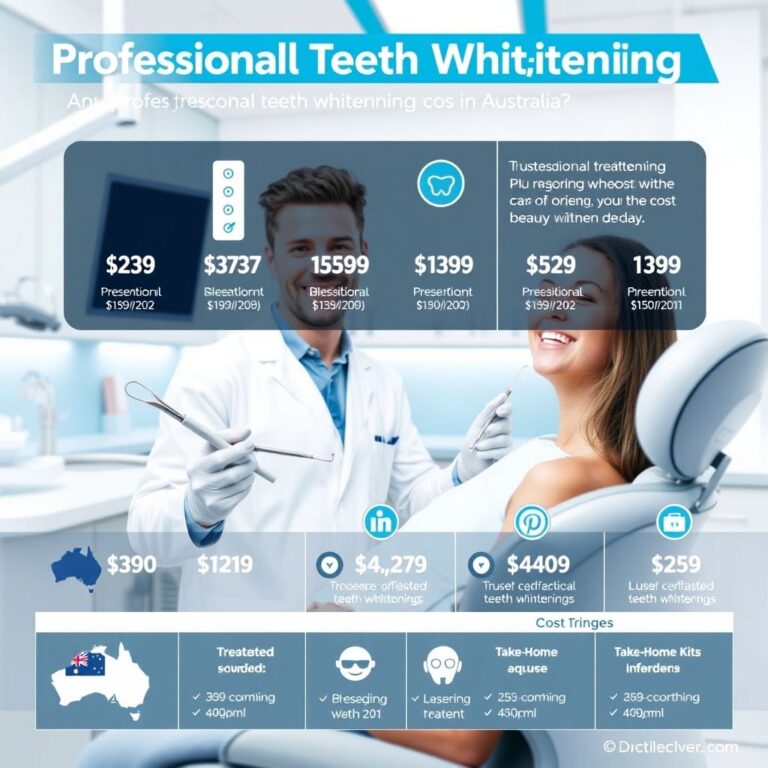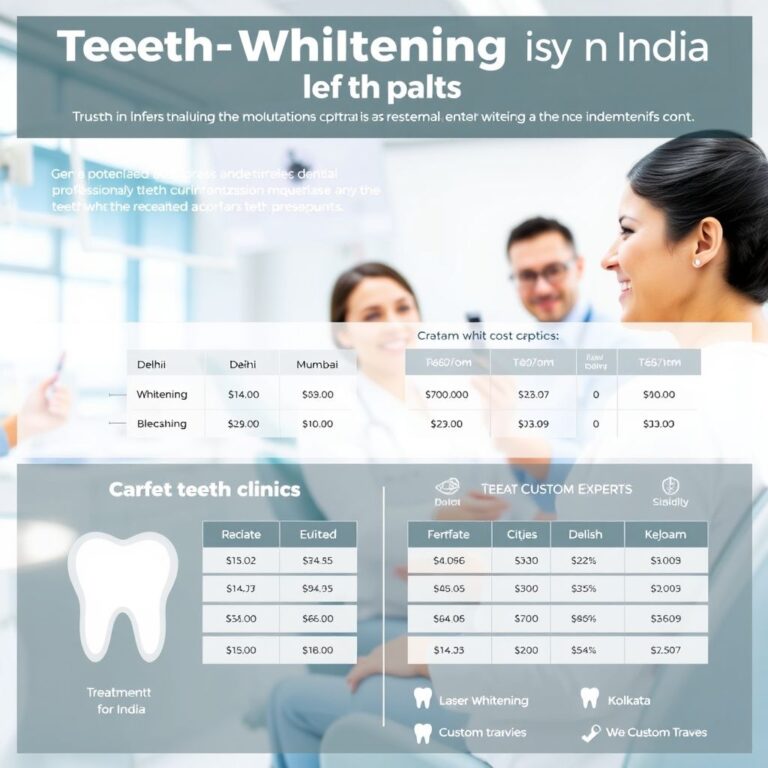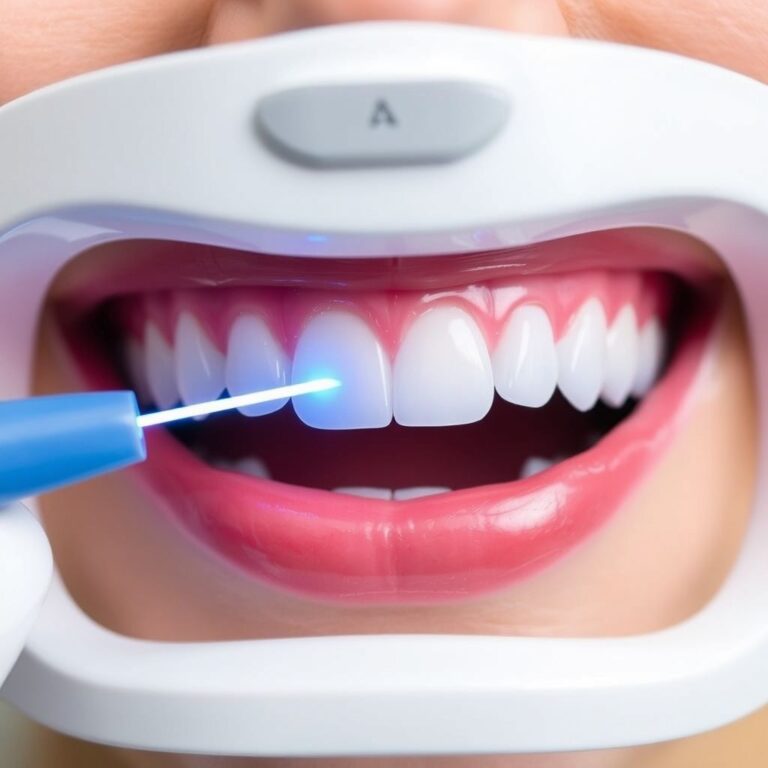Average Cost of Teeth Whitening
Teeth whitening has become a popular cosmetic dental procedure aimed at improving the appearance of one’s smile. With a variety of methods available, including professional treatments and over-the-counter products, the cost can vary significantly. This article delves deep into the factors influencing the cost of teeth whitening, the different methods available, their efficacy, and the overall impact on dental health. By the end, you’ll have a thorough understanding of the average cost of teeth whitening and what to expect from each method.

Understanding Teeth Whitening
What is Teeth Whitening?
Teeth whitening involves bleaching your teeth to make them lighter. It can’t make your teeth brilliant white, but it can lighten the existing color by several shades. The process removes stains and discoloration from the tooth surface, leading to a more attractive and brighter smile.
Why Do Teeth Get Discolored?
Teeth can become discolored for several reasons:
- Dietary Habits: Consuming foods and drinks like coffee, tea, red wine, and cola can stain your teeth.
- Smoking: Nicotine and tar from tobacco can make teeth yellow.
- Age: As you age, the enamel on your teeth wears down, revealing the yellow dentin beneath.
- Medications: Certain medications can cause tooth discoloration as a side effect.
- Poor Dental Hygiene: Inadequate brushing and flossing can lead to plaque and stains on the teeth.
Types of Teeth Whitening Methods
In-Office Professional Whitening
In-office teeth whitening is performed by a dentist using professional-grade bleaching agents. This method is known for producing immediate and dramatic results. The average cost ranges from $500 to $1,500 per session, depending on the location and the dentist’s expertise.
Benefits
- Fast Results: Typically, a single session is enough to see significant improvement.
- Expert Supervision: The procedure is carried out by a professional, ensuring safety and effectiveness.
Drawbacks
- Cost: It is the most expensive whitening option.
- Sensitivity: Some patients may experience tooth sensitivity post-treatment.
At-Home Professional Whitening Kits
These kits are provided by dentists and include custom-made trays and a professional-grade bleaching gel. The cost ranges from $200 to $600.
Benefits
- Convenience: You can whiten your teeth at home.
- Customization: Trays are tailored to fit your teeth, ensuring even application of the whitening agent.
Drawbacks
- Time: It takes longer to see results compared to in-office treatments.
- Compliance: Requires adherence to the dentist’s instructions for optimal results.
Over-the-Counter Whitening Products
These include whitening strips, gels, toothpaste, and mouth rinses available at pharmacies. The cost ranges from $20 to $100.
Benefits
- Affordability: The most cost-effective option.
- Accessibility: Easily available without a prescription.
Drawbacks
- Efficacy: Results are less dramatic and take longer to achieve.
- Uniformity: These products may not provide even whitening.
Natural Whitening Methods
Some individuals opt for natural methods such as baking soda, activated charcoal, and oil pulling. These methods are generally inexpensive but lack scientific backing for their effectiveness.
Benefits
- Cost: Very low-cost option.
- Natural Ingredients: Free from chemicals and artificial additives.
Drawbacks
- Effectiveness: Results vary and are generally less significant.
- Safety: Some methods can be abrasive and damage enamel.
Factors Influencing the Cost of Teeth Whitening
Geographic Location
The cost of teeth whitening varies significantly depending on where you live. Urban areas with higher living costs typically have higher prices for dental procedures.
Dentist’s Expertise
Experienced and well-known dentists may charge more for their services. Their reputation and skill level can justify the higher cost due to the quality of care provided.
Method Chosen
As discussed, the type of whitening method significantly impacts the overall cost. Professional in-office treatments are the most expensive, followed by professional at-home kits and over-the-counter products.
Condition of Teeth
The initial condition of your teeth can influence the cost. Severely stained or discolored teeth may require multiple sessions, increasing the total expense.
Additional Treatments
Some patients may need additional treatments such as cleaning or cavity fillings before the whitening procedure, adding to the overall cost.
Detailed Cost Breakdown
| Whitening Method | Average Cost (USD) | Duration for Results | Pros | Cons |
|---|---|---|---|---|
| In-Office Whitening | $500 – $1,500 | Immediate (1 session) | Fast results, professional supervision | High cost, potential sensitivity |
| At-Home Professional Kits | $200 – $600 | 1-2 weeks | Custom trays, professional-grade gel | Slower results, requires compliance |
| Over-the-Counter Products | $20 – $100 | 2-8 weeks | Affordable, easily accessible | Less effective, uneven results |
| Natural Methods | $5 – $50 | Varies | Low cost, natural ingredients | Unproven efficacy, potential risks |
Pros and Cons of Teeth Whitening
Pros
- Improved Appearance: Whiter teeth can enhance your smile and boost your confidence.
- Non-Invasive: Most whitening procedures are non-invasive and do not involve surgery.
- Quick Results: Especially with professional treatments, results can be seen almost immediately.
Cons
- Sensitivity: Teeth whitening can cause temporary sensitivity to hot and cold.
- Cost: Professional treatments can be expensive.
- Maintenance: Results are not permanent and require maintenance treatments to sustain.
FAQs
Is Teeth Whitening Safe?
Yes, teeth whitening is generally safe when performed by a professional. Over-the-counter products are also safe when used as directed. However, improper use of whitening products can cause damage to the teeth and gums.
How Long Do the Results Last?
The longevity of teeth whitening results varies depending on the method used and individual habits. Professional whitening can last from six months to three years, while over-the-counter products may require more frequent touch-ups.
Can Anyone Get Their Teeth Whitened?
Most people can benefit from teeth whitening, but it is not recommended for children under 16, pregnant or lactating women, or individuals with sensitive teeth or allergies to whitening agents.
What Are the Side Effects?
The most common side effect is tooth sensitivity, which is usually temporary. Some individuals may also experience gum irritation.
How Can I Maintain My Whitened Teeth?
To maintain whitened teeth, avoid foods and drinks that stain, practice good oral hygiene, and consider using a whitening toothpaste. Regular touch-up treatments may also be necessary.
Conclusion
Teeth whitening can significantly enhance your smile and boost your confidence. Understanding the different methods available, their costs, and their effectiveness can help you make an informed decision about which option is best for you. Whether you choose professional in-office treatments or over-the-counter products, maintaining good oral hygiene and avoiding staining foods and drinks can prolong the results.


